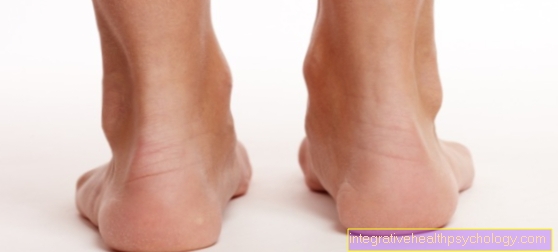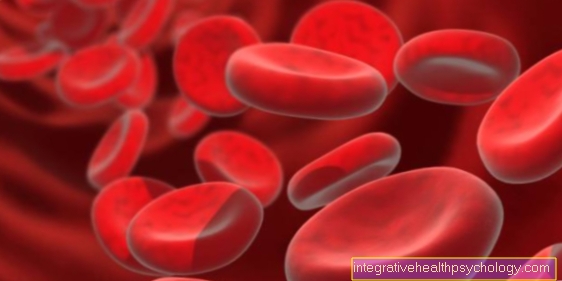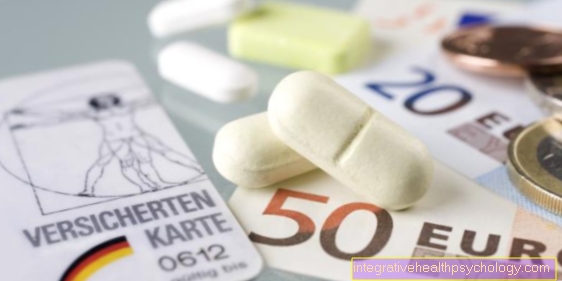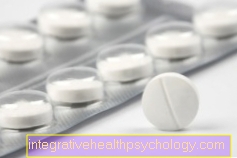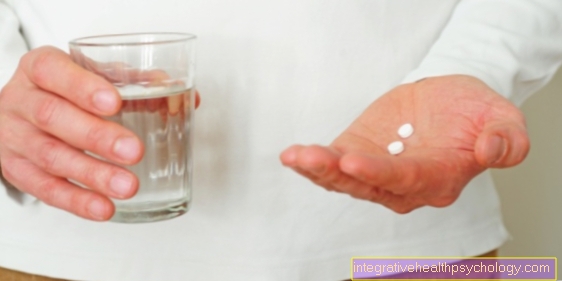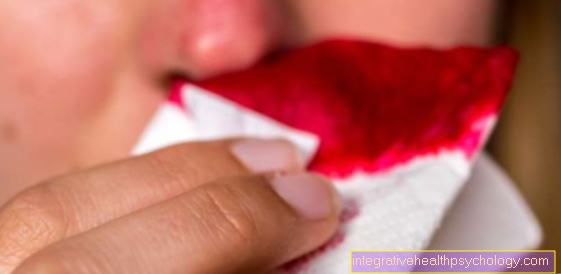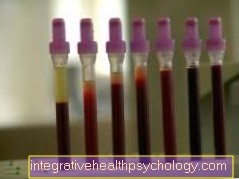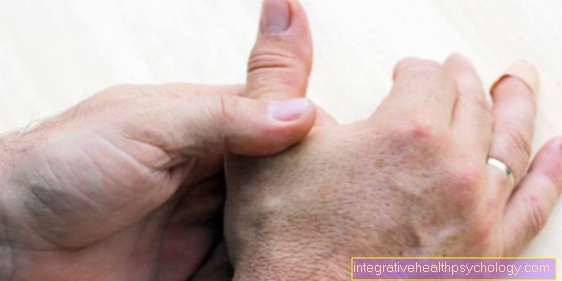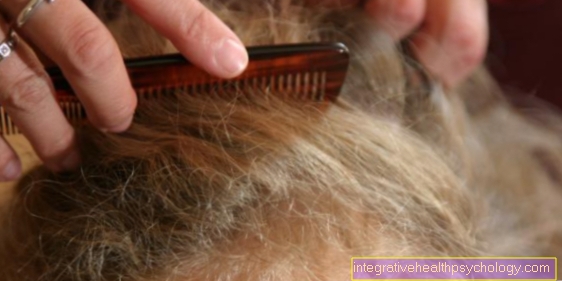Kijimea® Derma
introduction
Many people complain about skin problems of all kinds. The demand for products that improve the complexion of the skin, improve eczema and other skin diseases and relieve symptoms is understandably very high. Kijimea® Derma is a product that is distributed by Synformulas GmbH and was developed for people with skin disorders.
The product, which is manufactured exclusively in Germany and Austria, is a dietary supplement. The small capsules are available in different pack sizes and are intended to help improve the skin's appearance over the long term.
What might also interest you: Kijimea®

Indications
Classic indications, as there are with conventional drugs, do not exist for Kijimea® Derma. It is a dietary supplement that is not prescribed or used to specifically treat one or more diseases. Rather, Kijimea® Derma has a supporting effect on general skin problems. This can be unspecific redness, dry, itchy or sensitive skin. According to the manufacturers of Kijimea® Derma, skin prone to eczema also benefits. In the case of skin diseases such as neurodermatitis, psoriasis, eczema or other skin conditions, however, Kijimea® Derma should at most be viewed as a supporting component of the treatment. In such a case, therapy by a dermatologist cannot be replaced by a dietary supplement.
Read more on this topic at: Skin disorders
acne
Approximately 85% of the population go through a phase in their life when they suffer from acne. Usually this is puberty. Fortunately, most acne heals between the ages of 20 and 30. In some people it unfortunately persists and causes skin imperfections, so-called Comedones. In severe cases, nodular abscesses and pustules are found that leave scars as they heal. Acne therapy consists of various components and stages, which depend on the severity of the disease. Both thorough skin cleansing and drug therapy are important to improve the complexion.
Kijimea® Derma is therefore not suitable for the sole treatment of acne. For some sufferers, however, an additional intake of Kijimea® Derma, parallel to the usual therapy and skin care, seems to help. The intake of Kijimea® Derma should be discussed with the treating dermatologist in the case of acne in order to better assess the course of the disease. Any improvements or deteriorations can thus be determined more objectively.
Read more on this topic at: Acne - This works best
Neurodermatitis
About 10 to 15% of the population are affected by neurodermatitis in childhood. The condition disappears over the course of life in many people, but in some it persists. Dry skin, itching and eczema are characteristic of atopic dermatitis, which is also called atopic eczema referred to as. There are some studies on the therapy of neurodermatitis with so-called probiotics. These are microcultures like those contained in Kijimea® Derma.
The research is contradicting itself and it is not clear whether there are real benefits from treatment with such probiotics. The benefit is very controversial, especially for the severe form of neurodermatitis. A recommendation is therefore not made by the specialist society of dermatologists. However, some studies have also shown positive effects on those affected. A treatment attempt with Kijimea® Derma can be carried out especially for mild forms of neurodermatitis.
What might also interest you: Treatment of atopic dermatitis
psoriasis
The cause of psoriasis has not been conclusively clarified, although some triggering factors are already known. Above all, genetic predisposition and so-called trigger factors play a major role in the development of psoriasis. Trigger factors are stimuli or triggers that lead to the onset of the disease. This can include drugs, infections or mechanical stress on the skin be. The therapy of psoriasis is complex and includes both local therapeutic measures and medication for internal use. However, therapy with probiotics is not part of it. The use of Kijimea® Derma for psoriasis is therefore not recommended. Efficacy cannot be assumed.
What might also interest you: Treatment of psoriasis
Side effects
There are currently no known side effects of Kijimea® Derma. If side effects or new symptoms as well as deterioration of the skin appearance should occur, this can and should be reported to the manufacturer.
Interactions
Since many people, especially in old age, take medication regularly, the question of interactions is very important. Over-the-counter drugs in particular can interact with other medications that cannot be directly controlled by a doctor. Such over-the-counter products are also called "over-the-counter medication". However, with Kijimea® Derma this risk does not exist.
There are currently no known interactions of Kijimea® Derma with other drugs. Especially people who have to take a lot of medication regularly should discuss the use of other over-the-counter active ingredients or dietary supplements with their doctor. New side effects or interactions can thus be more easily assigned to an active ingredient.
Compatibility with alcohol
In principle, there is nothing wrong with taking Kijimea® Derma and simultaneously consuming alcohol, as no interactions are to be expected. However, there may be increased side effects, mainly affecting the gastrointestinal tract. Flatulence, diarrhea, or stomach pain are possible consequences. However, no more serious side effects or interactions are known. Nevertheless, alcohol consumption has a very negative effect on many skin problems, so that the improvement of the skin through consumption is limited. For Kijimea® Derma to work well, alcohol consumption should therefore be kept to a minimum or even avoided.
Contraindications
The dietary supplement Kijimea® Derma is hard capsules that form a microculture, Riboflavin and Biotin contain. Riboflavin and Biotin both belong to the group of B vitamins, whereas the microculture L. salivarius FG01 Contains microorganisms. There are no known contraindications for Kijimea® Derma. People with chronic diseases such as diabetes mellitus, high blood pressure or other diseases are also allowed to take Kijimea® Derma.
The product is lactose-free, so lactose intolerance is not a problem either. However, in the event of intolerance to Kijimea® Derma, consumption should be discontinued. A deterioration in the skin's appearance should also lead to discontinuation of Kijimea® Derma.
dosage
The food supplement Kijimea® Derma is recommended by the manufacturers of the product for daily consumption. The hard capsules, which are a microculture, Riboflavin and Biotin should be swallowed whole twice a day. meals are a good time to take them. The capsules are swallowed with sufficient liquid. For an optimal effect, the manufacturer recommends consuming the capsules for a period of at least four weeks. According to the manufacturer, a longer intake of twelve weeks is even better and makes the dietary supplement more effective. The recommended daily dose of Kijimea® Derma should not be exceeded.
Active ingredient
The product Kijimea® Derma is available in the form of hard capsules. The hard capsules contain a kind of powder that should not be dissolved in water, but should be swallowed whole in its capsule. The capsule dissolves in the digestive tract, where it releases the active ingredients. A daily dose of Kijimea® Derma, which consists of two capsules, contains 1.4 mg of riboflavin, 150 micrograms of biotin and 2x107KBE the microculture L. salivarius FG01.
The CFU unit stands for "colony-forming unit". This unit is used to measure and specify the quantity of such microcultures. The vitamin Riboflavin covers the recommended daily dose in the dose contained in Kijimea® Derma, biotin is even contained in three times the amount of the recommended daily dose. In combination, the active ingredients should promote a healthy complexion and help to improve skin problems of various types.
The capsules have an expiry date after which they should no longer be consumed. They are to be stored at room temperatures below 25 ° C in a dry environment. The capsules should be discontinued in the event of new symptoms or side effects. For a good effectiveness, an intake of at least four, but better twelve, weeks is recommended.
effect
Kijimea® Derma capsules contain a combination of three active ingredients, namely a microculture and two vitamins from the vitamin B family. According to the manufacturer, the microculture called L. salivarius FG01 unfolds its effect in the digestive tract. Similar to other probiotics, it is supposed to help support the healthy intestinal flora and intestinal barrier. Some may wonder what the intestines have to do with skin problems. The origin of many skin problems is still not 100% understood and clarified today. In some eczema diseases, various scientists assume that the intestines play an important role in the development of the disease.
To what extent the intestine is involved and what ultimately triggers the disease is usually not known. The effect of microcultures on the intestinal flora and an improvement in skin diseases has been investigated in various studies. However, the results are contradictory and cannot clearly demonstrate healing or positive effects. Nevertheless, the manufacturers of Kijimea® Derma rely on the effect of the microculture of their product on various skin diseases. Subjective experience reports show that Kijimea® Derma has improved the complexion of some people with skin problems.
Apart from the said microculture, Kijimea® Derma contains riboflavin and biotin, two vitamins from the vitamin B family. Riboflavin takes on important metabolic functions in the body and protects cells from oxidative stress. It is therefore a so-called antioxidant. Biotin, which is also called vitamin B7, has several important functions in the body. Symptoms of a biotin deficiency include skin disorders, hair loss and brittle nails. In combination with each other, the three active ingredients should help to strengthen and protect the skin in a natural way.
price
There are different prices for Kijimea® Derma, which differ depending on the pack size and provider. The product can be purchased in pharmacies as well as various online pharmacies and shops. The smallest pack size contains 14 hard capsules and is sufficient for approximately one week of use. The prices vary and range from 11 to 16 euros. The medium pack size contains 28 hard capsules and is suitable for two weeks of use. Here, too, there are different prices in the range from around 21 to 29 euros. The largest pack size of Kijimea® Derma contains 84 hard capsules and thus covers four weeks of use. Depending on the offer, prices range between 56 and 76 euros. The price difference is currently the greatest in this category, so it is worth looking for offers.
Kijimea® irritable bowel syndrome
Like Kijimea® Derma, Kijimea Irritable Bowel is a hard capsule, but it is suitable for use with irritable bowel symptoms. It contains a strain of bifidobacteria called B. bifidum MIMBb75, which should help to improve the disturbed intestinal barrier in irritable bowel syndrome. According to the manufacturer, Kijimea® irritable bowel helps to form a kind of protective layer on the intestinal mucosa and so alleviates the typical symptoms of irritable bowel syndrome. The manufacturers recommend taking one hard capsule daily. The capsule can be taken at any time of the day, but preferably with a main meal. It should be swallowed whole with plenty of water.
A minimum of four weeks is recommended. According to the manufacturer, however, better effects and greater effectiveness are achieved after twelve weeks. The capsules are gluten and lactose free and contain no preservatives or sweeteners. They can also be used during pregnancy and breastfeeding. Side effects or interactions with other drugs are not known. However, if new complaints or side effects occur, this should be reported to the manufacturer.








